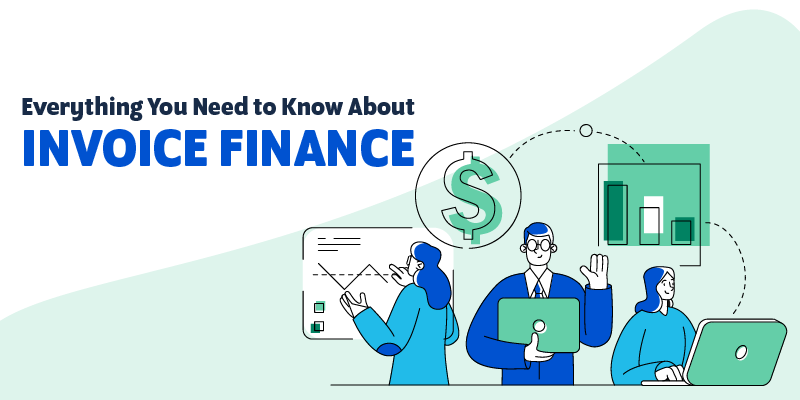Everything You Need to Know About Invoice Finance
When it comes to running a business, cash flow is generally not consistent. Not all business models run on a straightforward path to earning revenue, and every business owner knows how important it is for funds to come in regularly. After all, you want smooth and continuous operations.
On your hunt for different sources of funding, you might have stumbled upon the concept of invoice finance, a popular type of financing for small businesses. If you are not sure what it means and what it can do for your business, this article will help you to dissect the topic.
Regardless of whether or not you pursue this type of funding for your business, it can be useful to know what makes invoice financing different from other forms of business finance.
Check out this infographic to understand more about how invoice financing works, as well as an explanation of the different types of invoice finance.
 Understanding Invoice Finance
Understanding Invoice Finance
In an ideal world, your customers pay you as soon as they receive goods and services. However, some job orders can stretch out for a while, and many customers opt for flexible payment options — especially for larger purchases. It is therefore easy to find yourself short on the necessary cash to support your current business operations and expenses.
This is where invoice financing comes in. Instead of using real estate property as collateral for funding, you can sell unpaid invoices to a third-party lending company.
Lenders will typically pay you 80% of the total invoices you use as collateral, so you have liquid funds to use for your business. The remaining 20% will be paid back once payment from the invoices has been collected, minus service fees.
Below is a closer look at the two main types of invoice financing.
-
Invoice Factoring
Invoice factoring arrangements may require a business to hand over its full accounts receivable ledger to the financing facility in return for a continuous line of credit (though partial ledger invoice factoring is available from some lenders). This can help small businesses that need a more consistent cash flow injection.
With this type of invoice financing, the financier will usually be in charge of your ledger, meaning they will collect payments and be the one to chase after slow payers. This helps relieve the burden of payment collection from small business owners, and can be useful for companies that do not necessarily have a strong accounting department. Note that invoice factoring arrangements are always disclosed, so your client base will be aware of the funding status of your company.
A potential downside to this is that the invoice factoring company may not handle your customers the same way that you usually would, as their primary concern is repayment.
-
Invoice Discounting
Like invoice factoring, invoice discounting gives businesses the opportunity to finance either their full or a part of their accounts receivable ledger. The main difference is that the responsibility of payment collection remains with the business.
This means that the company receiving finance retains control over their ledger, and the lender does not contact their customers for payment, keeping the business’ funding status as confidential and undisclosed. You may want to opt for this type if you do not want your customers to know your company's financial activities and you prefer to handle debt collection yourself.
Confidential vs. Disclosed: What is the Difference?
In learning about the different types of invoice financing, we briefly discussed types that disclose your funding activities to your customers, and types that do not. What is the difference between them, and why does it matter if your customers know?
-
Confidential financing
Many businesses prefer confidential financing, so customers do not have to know that you are using a finance provider.
With confidential financing, you retain the responsibility of your accounts receivable and the collection of payment from your customers, such as invoice discounting. If you want to maintain strong relationships with your customer base, this may be the way to go.
However, there are stricter requirements for a business to receive confidential financing. Major areas that a lender will look at include your business’ annual turnover, and the length of time that you have been operating. If they deem that your net assets are not sufficient, or that you have not been in business long enough, they will not allow you to have a confidential agreement.
-
Disclosed financing
Since not all companies will meet a lender's criteria for confidential terms, another option to consider is disclosed financing. Because of the more lenient eligibility criteria involved, disclosed financing can be particularly useful for new businesses and startups.
A disclosed invoice financing arrangement means your customers will need to be notified that your invoices are financed, so that they are aware of debt collection.
While the requirements for disclosed financing are more lenient, the service does usually cost more. This is because businesses will have to factor in administration fees from the lender in processing the customers' payments.
There are some cases under disclosed hybrid invoice financing where you can still manage your ledger — this is known as Partnership Factoring. With these arrangements, your customers will still receive a notice of assignment, which states that their invoice will be handled by a third party, but your business retains control of payment collection. This is the lowest cost form of invoice factoring.
Fund your business wisely
As you run your business, you will come across many different types of funding. Learning about them is key to understanding how you can access money to keep your company running and growing.
Should you need invoice finance or other types of funding assistance for your small business, Earlypay has various products that offer flexible loans. Contact us today to learn how we can help grow your business.

